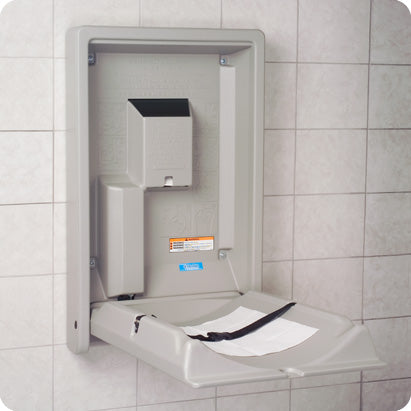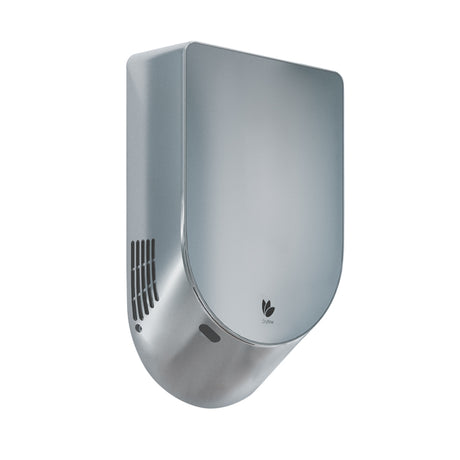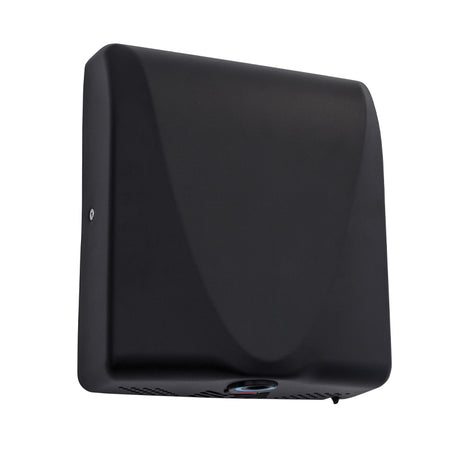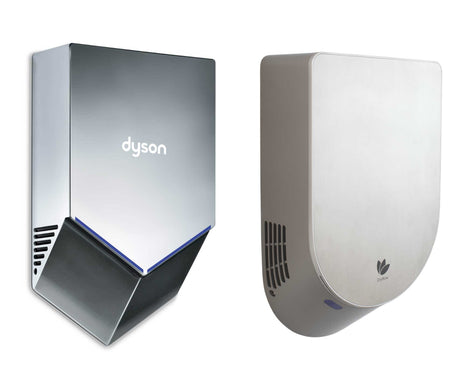25/01/2017
Commercial baby changing tables were invented in New York in 1929, after an urban planner heard that mothers had to reduce their time in the city, because of the need to go back home to change their baby’s nappy. Decades would pass until these bathroom fittings were really popularised, due to the inclusion of women in the workplace (overall since the 80s) and the subsequent growing parity.
The changing stations would be more common in ladies’ restrooms, but men themselves and laws have recently requested baby changers in men’s public toilets, therefore it seems that these products are going to be evenly distributed in new and refurbished facilities. This equipment gets its own place in large buildings nowadays: a unisex baby changing room.
Main Features of a Commercial Baby Changing table
We consider that there are four fields that comprise the concepts that one could take into account when selecting a baby changing station for commercial areas.

1) Layout
– The baby changer dimensions, paying special attention to the bed area.
– The placement of the unit (countertop, wall), its type of mounting (surface, recessed) and the orientation (horizontal, vertical).
– The design, like its shape, the smoothness of the materials, the colours or if the fixing is concealed.
2) Safety
– Any element that ensures child protection like a deep changing surface, adjustable belts or round corners.
– Hygiene enhancement such as antibacterial components or bed liners dispensers.
– Compliance with the regulations and standards.
– Tested weight resistance.
3) Durability
– Long-lasting and vandal proof materials.
– Extensive guarantee.
– Fire resistance.
4) Convenience
– Integral accessories such as liner dispensers or nappy sacks as well as hooks for changing bags or similar.
– Accessibility for adults, as we are going to explain in the next section.
– Simple and fast maintenance.
– Spare parts and accessories.
As any other item, we will evaluate the availability of the product, the delivery options and its price, of course.
Baby Changing Tables Used by Disabled Adults
In order to provide the greatest accessibility for those adults with reduced mobility, like grandparents or those disabled, we advise to think about these notions when picking and/or installing a commercial baby changer:
- Concerning its layout and placement in the facilities, the most common is a folding table (whether countertop-mounted or wall-mounted), but it is also possible that a solid surface acts as a changing station. In this case, we should take into account wheelchair users.
- With regard to the baby changing table height when it is close, we could not find anything in Approved Document M, but this summary of the English regulations suggests 1000 mm maximum height from the floor for bathroom fittings like soap dispensers or locates the centre of vertical bathroom grab rails at 1100 mm. That’s why the reaching point to grab and fold down the changing table should be approximately near these figures. In Ireland, according to Building for Everyone guidelines , a baby changing room should comprise two changing benches or tables at 800mm and 1200mm, to cater for visitors of different heights and either seated or standing.
- Likewise, we found nothing specific in Doc M about how high the changing surface should be when it is open, however, the recommended height for a washbasin is 740 mm from the floor.
- The easiness to control the opening and closing of the folding table mechanism from either side of the baby changing station.
Let’s make sure that all adults can take children with them outside with few logistic worries. Feel free to visit our category of baby changing tables for sale.
Do not hesitate to call us, should you have any questions or requests about commercial baby changing tables. Note that, apart from folding changing tables and toilet door signs , we also sell long-life sensor taps , bathroom grab rails (also in Doc M packs), quiet hand dryers or other sanitary accessories like door hooks.




